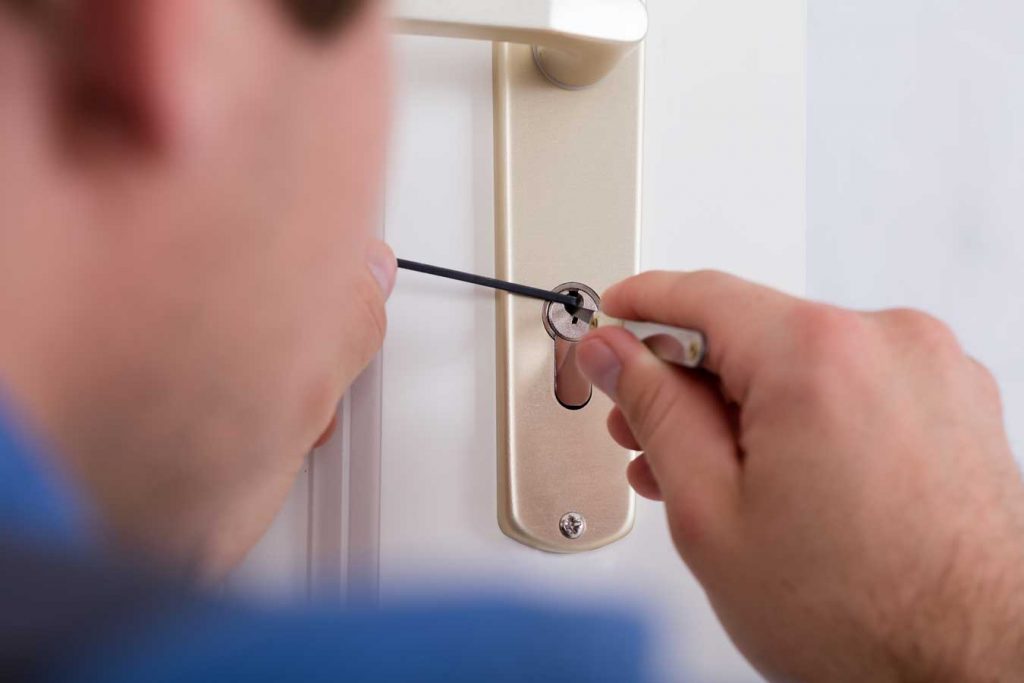For many people, the notion of using a credit card to open a commercial door may seem intriguing. Whether it’s due to lost keys or accidental lockouts, this question often arises when considering alternatives to calling a professional locksmith. But can you actually open a commercial door with a credit card? Understanding the possibilities and limitations of this method is crucial for homeowners, renters, and business owners alike, and can provide insight into potential security vulnerabilities.
Generally, the idea of unlocking a door with a simple card may work in certain scenarios, but it involves several considerations that need addressing. Before you attempt to use a credit card to bypass a lock, it’s vital to understand how locks function and what implications such an action might have on security.

How Door Locks Work
To appreciate why a credit card might succeed in opening a door, it’s necessary to examine how door locks operate. Traditional pin tumbler locks rely on the alignment of pins to permit the cylinder to turn, granting access. However, commercial doors frequently employ more robust locking mechanisms for enhanced protection.
Some commercial doors use lever handles or deadbolts, which are considerably more resistant to simple bypass techniques. Understanding these mechanisms can highlight why using a credit card often falls short as a viable method for entry.
The Science Behind Using a Credit Card
The idea of using a credit card stems from the method of exploiting the gap between the door and the frame. For certain basic spring-latch locks, this technique might work by pushing the latch back with the card. Nevertheless, this method fails when met with deadbolts or higher-security locks, which are commonplace in commercial settings.
Furthermore, using a card typically requires a specific angle and skill, reducing the likelihood of success without potentially damaging the card or door.
Potential Risks
Attempting to open a commercial door with a credit card poses risks. Damage to the card, lock, or door itself is possible. Moreover, trying to enter a commercial property without proper authorization could lead to legal consequences, underscoring why professional intervention is recommended instead.
Legal and Ethical Implications
Before even considering using a card to unlock a door, it’s prudent to think about legal and ethical aspects. Unauthorized entry is often illegal and can result in criminal charges. Always ensure that you have permission or ownership of the premises before attempting any lock manipulation techniques.
Security Concerns
For businesses, the idea that doors might be accessible with simple tools raises significant security concerns. It’s crucial for companies to utilize locks that resist such crude methods. Upgrading locks or engaging a licensed locksmith can mitigate these risks.
This guide provides detailed insights into selecting appropriate locks for commercial spaces.
Exploring Alternatives
Rather than attempting to open a door with a credit card, consider alternative strategies in case of a lockout. Utilizing alternative entry points, contacting professionals, or setting up preventive measures like key management systems can be invaluable.
Regularly educating yourself and your employees about effective security practices can safeguard against the repercussions of lockouts. You can also explore this article on protecting business data during a lockout for further insights.
Benefits of Professional Help
Hiring a professional locksmith remains the most reliable way to regain access safely. Not only do they possess the requisite skills, but they also bring tools specific to unlocking robust mechanisms, minimizing damage or risk.
Modern Security Features
Advancements in lock technology, such as electronic locks with customized codes, make traditional bypass methods less effective. These contemporary systems offer enhanced security and can reduce the frequency of lockouts by offering versatile access solutions.
Learn how electronic locks aid in diminishing lockout occurrences.
How to Handle a Lockout
If you’re locked out, it’s wise to stay calm and evaluate your options. Assessing alternate entry points or calling for help is advisable. You can further visit this guide on handling office cabinet locks which may be relevant for similar instances.
Future Security Considerations
Ultimately, maintaining robust security systems for commercial spaces is not just about preventing break-ins but also about ensuring smooth operations without disruptions. Consistently reviewing and upgrading security measures can provide peace of mind and prevent future complications.
Training & Preparedness
Making sure that your staff is equipped to deal with lockouts is vital. Routine training sessions can help minimize the issues related to emergencies. You can look into this resource on conducting lockout drills for more information.
What Business Owners Should Know
As a business owner, knowing the ins and outs of your space’s security can greatly impact operational efficiency. Being informed about lock systems and staying updated on new technologies can safeguard your premises effectively.
The Role of Building Managers
Managers play a pivotal role in maintaining and overseeing security protocols. They must ensure the locks are functioning properly and that any security issues are addressed promptly. Check out the role of building managers in office lockouts here.
Conclusion
Attempting to open a commercial door with a credit card might appear convenient but seldom ensures success or legality. By investing in better security measures and seeking professional assistance, businesses can avert potential security lapses and legal issues.

FAQs
Can any card open a door?
While theoretically possible with certain basic locks, most commercial locks resist such methods, making success improbable.
Is it illegal to attempt entry with a card?
Without proper authorization, using a card to unlock a door can lead to legal consequences.
How can I prevent lockouts?
Implement preventive strategies like regular key management, employee training, and investing in advanced security systems.
This article contains affiliate links. We may earn a commission at no extra cost to you.





